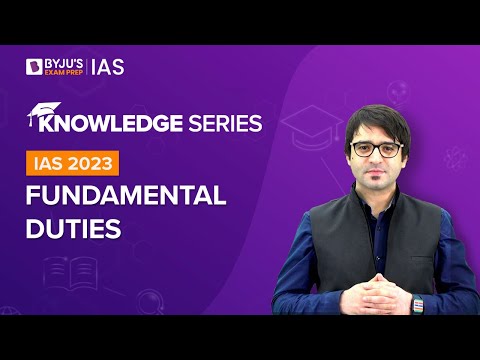
The Swaran Singh Committee in 1976 recommended Fundamental Duties, the necessity of which was felt during the internal emergency of 1975-77. The 42nd Amendment Act of 1976 added 10 Fundamental Duties to the Indian Constitution. The 86th Amendment Act 2002 later added the 11th Fundamental Duty to the list.
Fundamental Duties – Indian Polity Notes
Download PDF Here

The Fundamental Duties are dealt with in Article 51A under Part-IV A of the Indian Constitution. The topic is important for IAS Exam as questions are recurring in all its three stages – Prelims, Mains and Interview.
This article will mention in detail the 11 Fundamental Duties and their importance in India. The topic forms a significant part of UPSC Political Science, which is one of the major subjects in Prelims, Mains GS-II and also optional under the UPSC Syllabus.
To complement your preparation for the upcoming exam, check the following links:

The fundamental duties which were added by the 42nd Amendment Act of the Constitution in 1976, in addition to creating and promoting culture, also strengthen the hands of the legislature in enforcing these duties vis-a-vis the fundamental rights.
The list of 11 Fundamental Duties under Article 51-A to be obeyed by every Indian citizen is given in the table below:
| S.No | 11 Fundamental Duties |
| 1. | Abide by the Indian Constitution and respect its ideals and institutions, the National Flag and the National Anthem |
| 2. | Cherish and follow the noble ideals that inspired the national struggle for freedom |
| 3. | Uphold and protect the sovereignty, unity and integrity of India |
| 4. | Defend the country and render national service when called upon to do so |
| 5. | Promote harmony and the spirit of common brotherhood amongst all the people of India transcending religious, linguistic and regional or sectional diversities and to renounce practices derogatory to the dignity of women |
| 6. | Value and preserve the rich heritage of the country’s composite culture |
| 7. | Protect and improve the natural environment including forests, lakes, rivers and wildlife and to have compassion for living creatures |
| 8. | Develop scientific temper, humanism and the spirit of inquiry and reform |
| 9. | Safeguard public property and to abjure violence |
| 10. | Strive towards excellence in all spheres of individual and collective activity so that the nation constantly rises to higher levels of endeavour and achievement |
| 11. | Provide opportunities for education to his child or ward between the age of six and fourteen years. (This duty was added by the 86th Constitutional Amendment Act, 2002) |
The Fundamental Duties form an important topic for IAS Prelims as can be seen from the past years’ question papers. Aspirants preparing for UPSC 2024 are advised to cover the topic with all facts and figures. The topic once understood can fetch you a great score in prelims and mains both.
Fundamental Duties are an inalienable part of fundamental rights. The importance of these are given in the table below:
| S.No | Importance of Fundamental Duties |
| 1. | They remind Indian Citizens of their duty towards their society, fellow citizens and the nation |
| 2. | They warn citizens against anti-national and anti-social activities |
| 3. | They inspire citizens & promote a sense of discipline and commitment among them |
| 4. | They help the courts in examining and determining the constitutional validity of a law |
The Fundamental Duties mentioned in Part IVA of the Constitution have been criticized on the following grounds:
Facts about Fundamental Duties for UPSC:
This Fundamental Duty article will be helpful for the aspirants for the upcoming UPSC Prelims examination. Download the fundamental duties’ notes PDF from the link given below:
Fundamental Duties-Indian Polity Notes
Download PDF Here
Aspirants looking forward to appearing for the upcoming civil services exam must skip the wait for the UPSC admit card and kickstart their preparation now as the syllabus is comprehensive and not much can be left for last-minute preparations.
From the perspective of UPSC CSE, the latest events of importance focussing on the violation or fulfilment of fundamental rights are asked as a part of current affairs in the prelims or mains examination. Thus candidates must also be prepared accordingly.
Also, review the UPSC Mains Syllabus carefully and look for aspects of questions based on the given topic in the final exam. For any further details, study material or preparation tips, turn to BYJU’S for assistance.
The Fundamental Duty added by the 86th amendment act directs citizens to provide opportunities for education to his child or ward between the age of six and fourteen years.